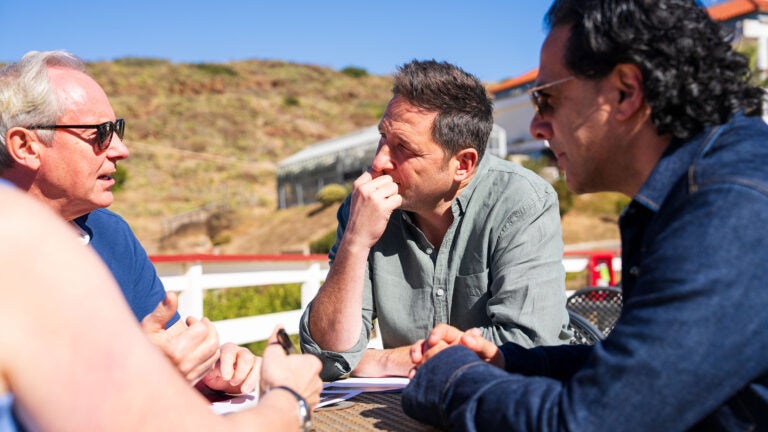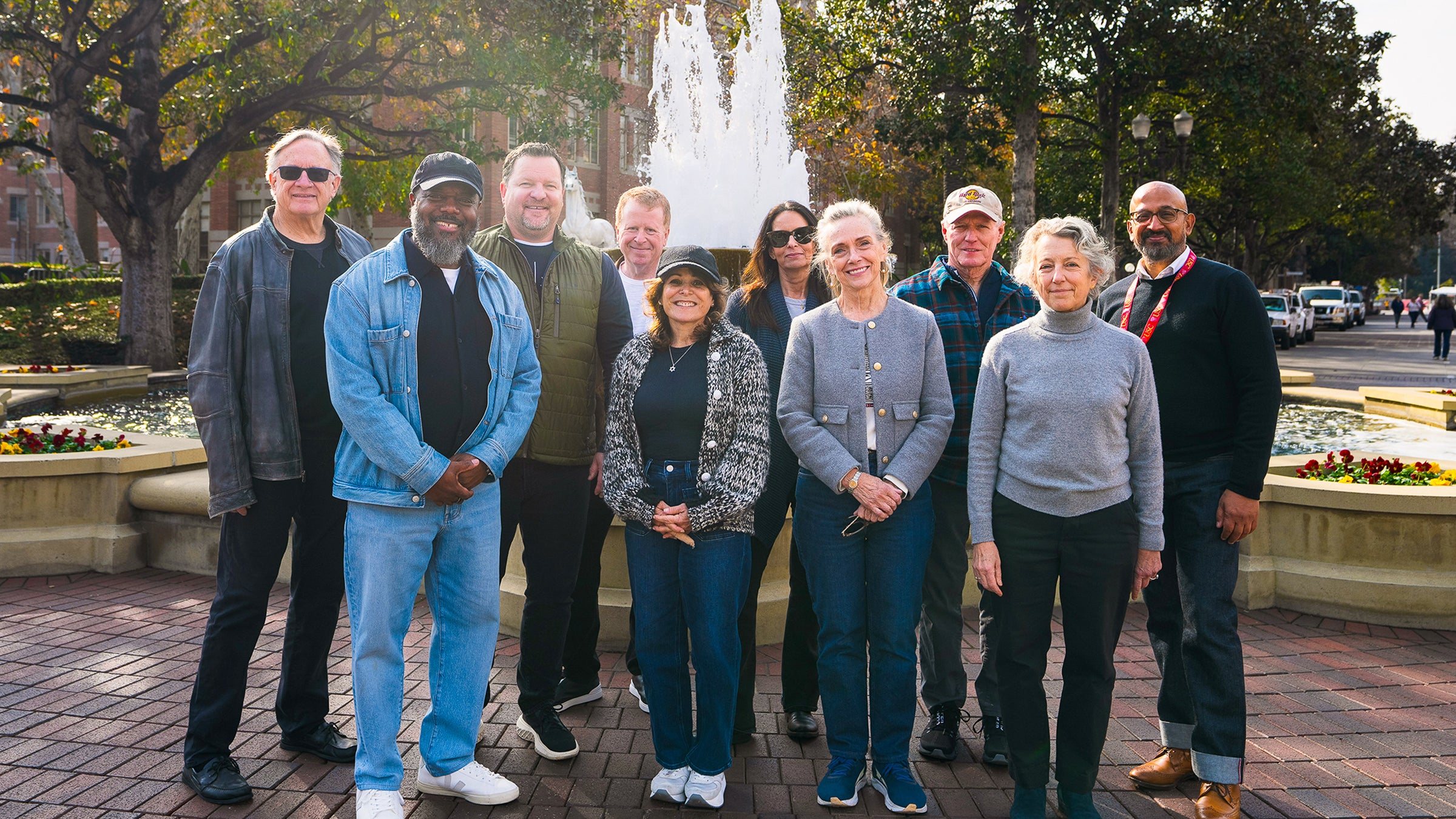
Writer-producer and USC School of Cinematic Arts alumnus Gabe Sachs (far right) is the USC Distinguished Leaders Program expert advisor in storytelling. He says it’s an essential skill for self-reflection and leadership. (Photo/Credit: Alex Tafreshi of 20 Twenty Productions)
Charting new paths for late career and beyond
USC’s Distinguished Leaders Program helps accomplished professionals redefine their next chapter.
What comes next after achieving career success?
For many accomplished professionals, that question looms large after decades of achievement. The USC Distinguished Leaders Program provides an answer, empowering individuals aged 50 and beyond to craft meaningful new chapters in their personal and professional lives.
This innovative six-month initiative leverages USC’s vast resources, bringing together renowned faculty to guide participants as they explore fresh opportunities for impact. Through in-person and virtual sessions, leaders refine their goals, build new skills and connect with an elite network of experts and peers while developing personal projects addressing pressing societal issues.
A program built on experience and exploration

Launched in September 2024, the USC Distinguished Leaders Program brings together alumni, faculty and top professionals across diverse fields. Participants engage in immersive on-campus experiences and flexible online learning, gaining insights from USC’s top minds in business, technology, policy, health and the arts.
“The people we attract are distinguished leaders, and so are the faculty members who work with them,” notes Tara Hein-Phillips, USC’s executive director of Continuing Education, Online and Global Programs.
Felicia Schwartz, a New York-based technology executive and parent of a USC Marshall School of Business alum, says she was at a turning point when deciding what she wanted to do next. The USC program, she says, “stood out because it focuses on using your life to help the world.”
Access to world-class faculty and research institutions
A core strength of the Distinguished Leaders Program is its access to USC’s world-class faculty and research institutions. Experts from various disciplines guide participants through decision-making, longevity, storytelling and technological innovation.
Program advisor Caroline Cicero is one such faculty member. An instructional associate professor at the USC Leonard Davis School of Gerontology and director of the USC Age-Friendly University Initiative, she helps participants explore the evolving concept of retirement not as an endpoint, but as a launchpad for new endeavors.
“In the Leonard Davis School, we study development — physical and social — throughout the lifespan,” Cicero explains. “I’m particularly interested in how people in later stages of life can evaluate their next steps.”
It’s this kind of expertise from Cicero and other USC faculty that provides Distinguished Leaders participants with a clear, actionable plan for their next chapter.
A focus on storytelling
The program’s structure blends rigorous academic engagement with real-world application. During a six-month span, Distinguished Leaders travel to four USC campuses and research institutes. They partner with faculty and peers to develop their goals and discuss technology, health care, sustainability and policy. They also participate in personalized coaching and small-group collaborations. Between these in-person sessions, Distinguished Leaders regularly meet with each other and expert advisors virtually.
The program emphasizes storytelling, sustainability, innovation and social good as its core pillars — all areas in which USC is noted for its expertise. And storytelling — one of its most transformative elements — is an essential skill for both self-reflection and leadership, says Gabe Sachs, a writer-producer (Freaks & Geeks, Diary of a Wimpy Kid) and an alumnus of the USC School of Cinematic Arts who serves as an expert advisor in storytelling, which is the program’s first phase.
“Personal narrative is about digging deeply into your life,” Sachs says. Participants engage in guided autobiography exercises and even experiment with visual storytelling, helping them articulate their journeys and future ambitions. They also strengthen their leadership foundations by writing down their own narratives.
Such storytelling is ultimately about being honest and sharing things about yourself you may never have revealed before, Sachs notes. That openness, he adds, “starts a conversation as people react and respond.”
Immersive experiences across USC campuses
The Distinguished Leaders Program combines on-campus intensives with the flexibility of online learning. Participants also travel to Catalina Island, home to the USC Wrigley Institute for Environment and Sustainability’s Marine Science Center.
“People hear ‘Catalina’ and think glamour and leisure,” says Jud DeLoss, a lawyer and CEO of the Illinois Association for Behavioral Health, who is also part of the initial cohort. “But we were on the side where research is done at very impressive facilities.”
Wrigley Institute Director Joe Árvai took the leaders through the psychology of decision-making and problem-solving and what that could mean for participants’ futures. Schwartz says the program is helping her hone her entrepreneurial skills to devise technology for combating anxiety and depression in children.
Participants also convene in person at the USC Institute for Creative Technologies in Playa Vista — also known as Silicon Beach — where they meet with AI and tech experts, including Leslie Ann Saxon, the executive director of the USC Center for Body Computing, about how best to use AI and other cutting-edge technology to achieve their goals.
Beyond meeting with renowned faculty in Southern California, the program also holds its second in-person session at USC’s new Capital Campus in Washington, D.C. “[Participants] have the opportunity to convene with global opinion leaders on the national stage,” says Kamy Akhavan, USC Dornsife Center for the Political Future executive director, who serves as an advisor in the program’s policy and impact section.
“I’m particularly looking forward to our time in D.C., because we’ll be able to meet several policymakers,” says cohort member Brian Sullivan, a media leader with 35 years of experience at such institutions as FOX Networks Group and Sky UK. Sullivan is using the program to develop innovative funding strategies to improve K-12 education access.
A personalized approach to lifelong impact
While the program offers structured learning, it also provides guidance through weekly one-on-one coaching sessions, ensuring participants remain connected and motivated. “Whether in-person or online, the program remains deeply personal,” Saxon says. Participants collaborate in regular breakout groups, offering feedback and support on each other’s impact areas.
“What I like about the curriculum is that it allows participants to draw from their past experiences while looking to the present and future,” Cicero observes. “They can assess their past and decide how they might use that to move forward.”
This flexibility has been invaluable for RoJean DeChantal, a former HR executive turned retirement advocate.
“After I retired, I got three more jobs,” DeChantal says. Through the program, she’s designing tools to help individuals plan their social lives and career transitions — while cultivating their interests — for the next stage of their lives.
Legacy of leadership
The breadth and depth of USC’s resources set the Distinguished Leaders Program apart.
“USC’s professional schools are a significant asset,” Cicero says. “Our USC Leonard Davis School of Gerontology, the oldest in the country, brings unparalleled expertise in aging. Plus, our USC School of Cinematic Arts is unmatched nationwide. The combination of these and other top-tier programs provide participants with unique tools to explore new ventures.”
The inaugural cohort includes executives, educators, nonprofit leaders, legal experts and technology innovators, all forging meaningful connections throughout the program with one another as mentors and collaborators. These networks will doubtless extend beyond the six-month curriculum, resulting in lifelong friendships and professional collaborations.
Expert advisor Sachs says he found that instruction is a two-way process for everyone involved: “[The Distinguished Leaders] showed me that there’s no limit to what you can learn and strive for,” he says.
“I spent most of my career telling people what I do,” Sullivan says. “Then I went through a phase of explaining what I used to do.” As his time in Distinguished Leaders continues, he adds, “I’m looking forward to telling people what I’m excited to do next.”
To learn more about USC Distinguished Leaders Program, or to apply, visit distinguishedleaders.usc.edu or email distlead@usc.edu.



